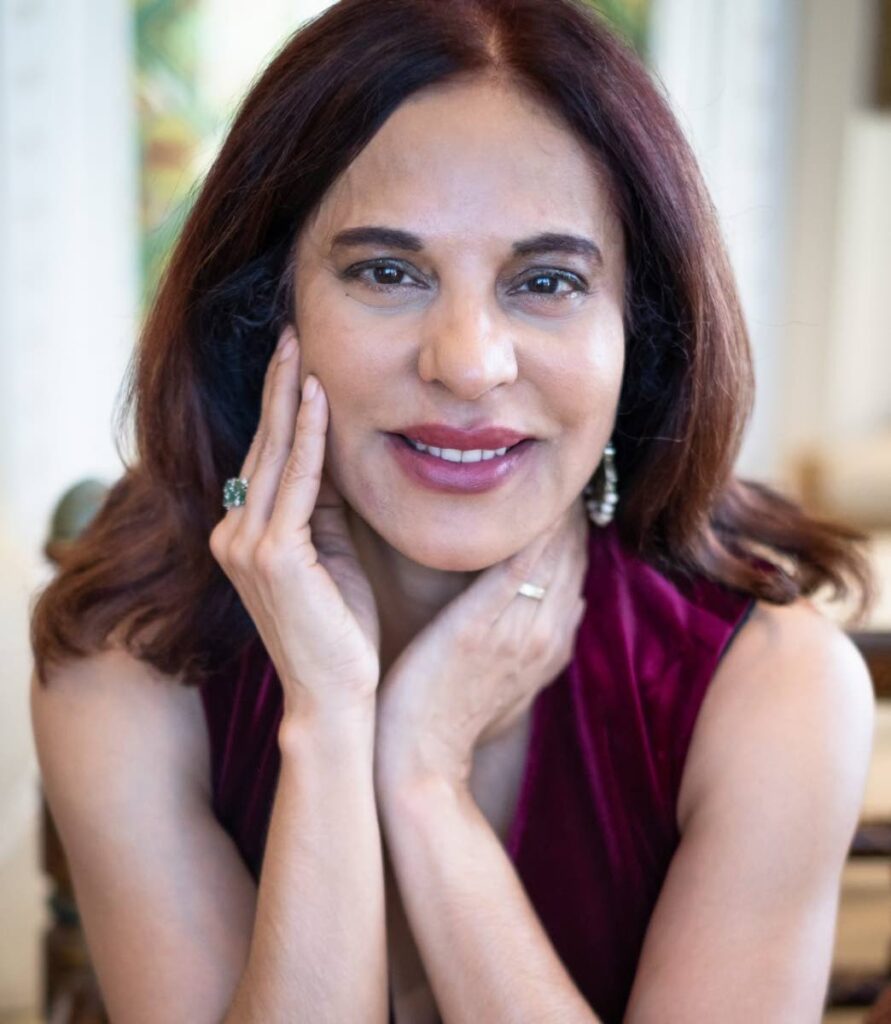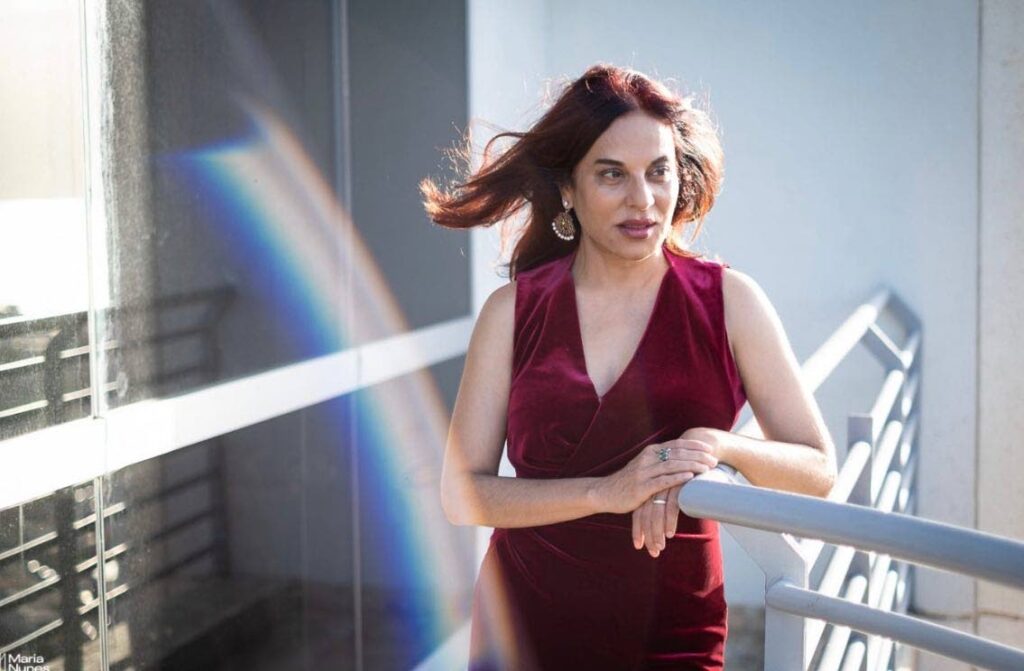Dark days

AS TOLD TO BC PIRES
My name is Ira Mathur and my memoir Love the Dark Days was published last year.
I was born in an army hospital in Guwahati, the heart of India’s tea country. My earliest memory is being in my ayah’s arms, following my grandmother and several soldiers on a hunt for mushrooms in the rainforest.
The exact address of where in Trinidad and Tobago I come from would be: The Museum, The Fort, Scarborough, Tobago. The museum annexe, our first home, became the heart of my childhood.
I live in Woodbrook now. But I think I am more ‘Bago to the Bone than Trini.
In the Indian Army, my dad was always moving all over India.
My brother was sent to boarding school at eight and my sister lived with my grandmother.
I was a very dreamy short-sighted child who spent a lot of time alone, making up stories.
My father sometimes got his orderly to play Ludo with me. Soldiers complained I cheated at snakes and ladders.
My mother said I was a very naughty child so, occasionally, I was sent to Bangalore to live with my grandmother. I adored her. She stuffed me with stories of the British monarchy and the Indian Raj, Sufi poetry and Arabian nights and her own family.
I have a family, my adult son Kiran and daughter Anika and my husband Imshah.
My beloved parents are still my best friends.
My sister also lives in Trinidad and has two children.
Always I was being admonished for my manners.
My adolescence in Tobago was the happiest days of my life, go-carting down the hill with my brother and his best friend Warren (now Dr Wheeler), the Yips, the Khourys, the Maharajes and the Serranos.
Moonlight picnics at Pigeon Point, parties at Mt Irvine, cocoa estates, overnighting at Charlotteville, watching fishermen bringing in early-morning catch.
There was always the sea in our hair and the salt and sun on us.
There was one tiny disco in Tobago but my brother wouldn’t let anyone dance with me or my sister. Some smart boy once asked my mom if she minded if he danced with me.
She said, “Yes.”
He said, “Yes, I could dance?”
Mom said, “Yes, I mind.”
The day a classmate called me a c---ie I was puzzled.
I said, with a strong Indian accent, as I had just arrived, “But I don’t lift loads!”
She called me crazy and we became best friends.
I didn’t realise c---ie was a pejorative term, just thought people were using it incorrectly.
I went to at least five primary schools in India and Tobago before going to secondary school at Bishops in Tobago.
And Oakdene School in Buckinghamshire, England.
I did my masters in journalism at City University, London.
We were raised around religious texts, the Quran from my grandmother and the Gita from father – but no rituals were involved. They were just part of the books we read in abundance, English classics, Urdu poetry, Archie comics (!).
I don’t believe in a standard God. I have an amalgam of beliefs that help me through tough times: karma exists; it’s clever to recognise how insignificant we are as humans.
We need to surrender to know we are not in charge. Human nature, sickness, and death is actually peaceful; and troubles teach us empathy, connection and consolation towards other humans.
I never stop reading. Six books on a go.
I love the old male gatekeepers. (Sorry.) Salman Rushdie, Philip Roth, Hanif Kureishi. Vikram Seth, Rohinton Mistry, Ian McEwan, Walcott, Naipaul, Saul Bellow.

And the stush women, AS Byatt, Virginia Woolf, Jean Rhys, Anita Brookner, Ruth Prawer Jhabvala
I have a love-hate relationship with Carnival. I love J’Ouvert, calypso tents, las lap – but I find pretty mas boring, dumbed down and snobbish.
And, amid DJs’ instructions to jump and wave, I think longingly of a cool bedroom and a book. I hate modern soca.
David Rudder is the greatest lyricist ever. Machel is top-tier in performance.
The human condition, the march of time, feeling like it’s all pointless makes me miserable. Also when people spell “lose” as “loose.”
I have never hit anyone in anger.
Unless biting my husband’s hand while giving birth counts.
It was inevitable that I would write about family in my first book.
My split life between continents, religions and ideologies was a monkey on my back. After I had children, I began forgetting some words in Hindi and Urdu and realised how quickly the past is forgotten. The book stopped that haemorrhaging.
I wrote my way into whether Dark Days would be a memoir.
The first version was a work of fiction called Unloved, based on a terribly spoilt great-grandmother courted by the Nizam of Hyderabad.
The Mathurs were the grown-ups in the room of a divided India, administrators for 200 years of Mughal rule. There simply wasn’t enough drama to write about.
Derek Walcott liked the bits about my childhood in India and Tobago the most. He said things like, “Khaki and crimson are your colours.”
I’m more relieved than pleased with the final version. It’s as if a necessary wound has been lanced.
How did my family react to be written about so honestly?
My parents revere books and literature with religious fervour. (We put books to our heads when they fall on the floor.) So their first response is pride that I’m published.
My dad asked why I didn’t make it more shocking.
My mom saw my dad off to three wars against China and Pakistan, left her lush family for an army officer and lost a son, so she lives lightly.
My children are absorbed in their own world.
My sister has been quiet about it.
A niece who is overwhelmingly supportive is my publicist.
I get asked about the book’s honesty all the time – but I don’t get the question. I never thought I was being too honest in writing Dark Days.
Journalism has trained us (newspaper writers) to be honest. I don’t know any other way to write. Even when the honesty is damning to me.
Everyone needs therapy.
Life gives us all a thrashing, and we could all use help.
If the bits in Dark Days about my breakdown help even one person to feel less alone, the book would be worth it.
Plumbing my family as material for Love the Dark Days was deeply exhausting. You have to dig out and examine all the pain rather than escape into a dreamy past. You have to make yourself alert and feel everything – but the craft does take over, which is a relief, and it becomes about the form rather than the content.
When it’s bigger than and, hopefully, will outlive you, it becomes worth it.
People in the colonies tend to be mannered, careful with our public persona, speak like the Victorians, and say “persons” instead of “people.” Like how former PM Patrick Manning would say, “Int he Year of Our Lord Two Thousand and 14” for 2014.
And then there’s BC Pires’ irreverent, hugely well read, kicksy writing, like the boys on any block seeing through our affectations, as Naipaul did but with uniquely Trini eyes, with enormous affection.
This entire Trini to the Bone series is a love letter to Trinidad. BC speaks of my honesty and I see his courage, how he bucks against the norms and forces us to see things we’d rather not.
Once, in Tobago, I saw two cars going opposite ways stop. A fella took out his bottle of rum, poured some in a glass, handed it to his pardner going the other way. And oblivious to all the angry honks of cars in traffic behind them, the two calmly took a drink.
We don’t let anything get to us.
To me, a Trini is a fierce proud, disproportionate talent, with a face like a Gauguin painting. And an inherent sense of equality and lyricism in everyday language. A Trini hides pain and sadness with jokes.
India belongs to nostalgia and dreams. Trinidad and Tobago is my life and my home. Is here I go dead. I love this country more than any other.
Read the full version of this feature on Friday evening at www.BCPires.com
Love the Dark Days is available at Paper Based at the Normandie, NEXGEN and on Amazon.

Comments
"Dark days"